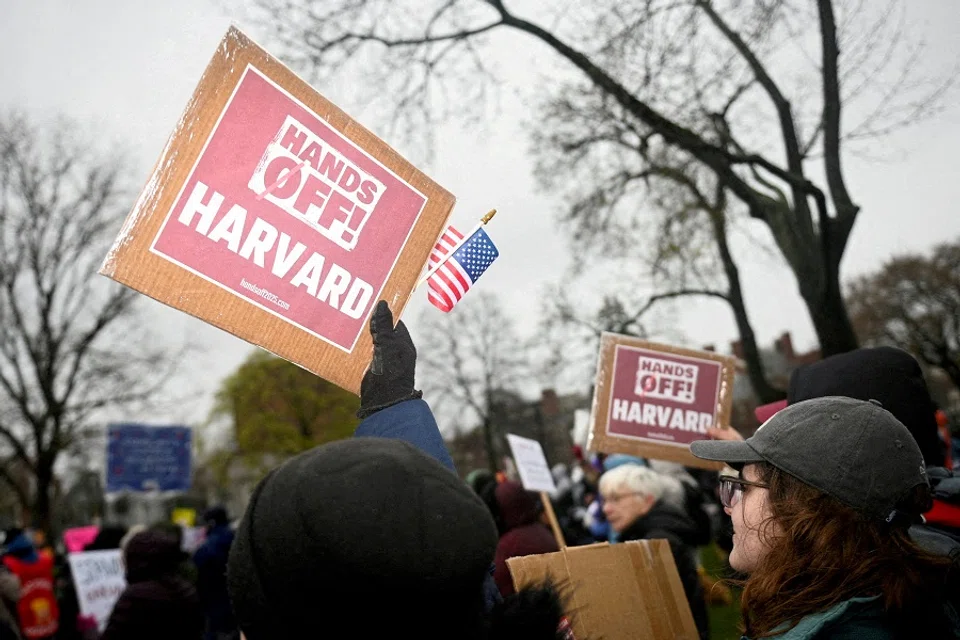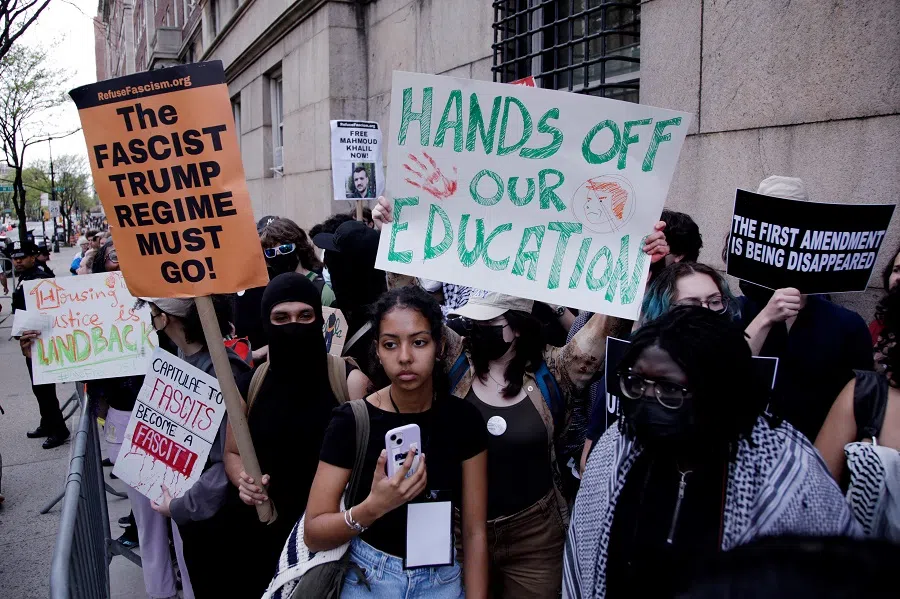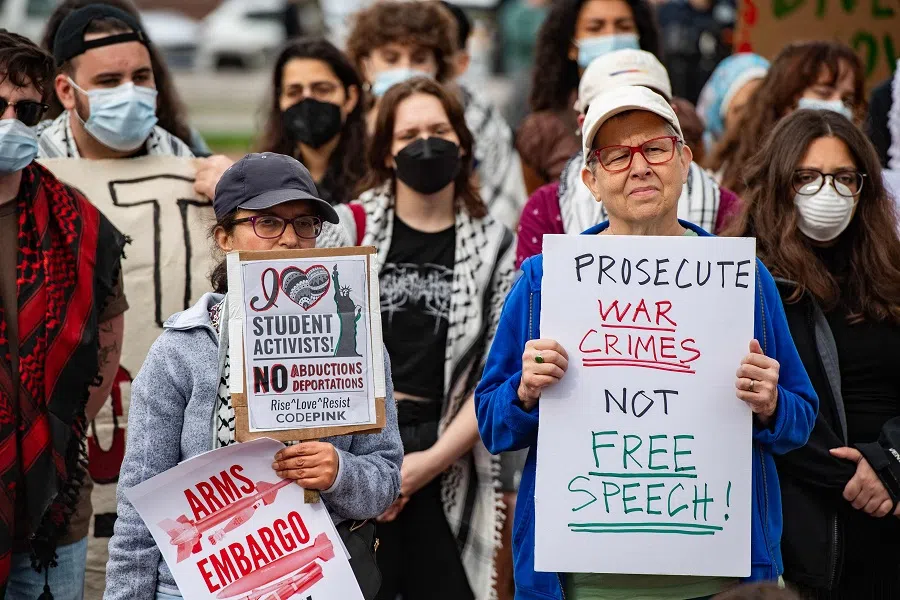How Trump’s assault on universities is sabotaging America’s future
US President Donald Trump has been taking harsh action on elite universities in the US, in an attempt to get them in line with government instructions on academic teaching and admissions, among other things. Commentator Chen Kuohsiang notes that this goes against academic freedom and the ideals of the US.

Prominent modern Chinese scholar Chen Yinke championed “the freedom of thought and spirit of independence”, which is precisely the soul by which universities guide the progress of an era. All of the world’s leading universities today cling to the principle of institutional autonomy, resolutely rejecting any kind of political intrusion.
American higher education institutions are facing a growing threat of political interference. The Trump administration is attempting to subdue elite universities by threatening to cut federal research funding under the pretext of combating anti-Semitism on campuses. It has called for the elimination of diversity, equity and inclusion programmes, a ban on masks at campus protests, merit-based hiring and admissions reforms, and a reduction in the influence of faculty and administrators deemed “more committed to activism than scholarship” by the Republican administration.
Universities that fail to comply risk sanctions, including the revocation of student visas and tax-exempt status, among other potential penalties. Elite universities were suddenly thrown into a state of anxiety and chaos, caught between a rock and a hard place. Some feigned compliance, while others surrendered. Harvard University, in particular, stood out for its defiance.
In a statement issued in mid-April, Harvard University President Alan Garber stated with profound grief that the Trump administration’s “prescription” exceeded the power of the federal government: “The University will not surrender its independence or relinquish its constitutional rights.” The university’s lawyers also asserted, “Neither Harvard nor any other private university can allow itself to be taken over by the federal government.” Garber further stressed, “No government — regardless of which party is in power — should dictate what private universities can teach, whom they can admit and hire, and which areas of study and inquiry they can pursue.” Harvard upheld its institutional autonomy, staunchly resisting the Trump administration’s murky flood of influence.
Self-defeating government actions
The Trump administration retaliated swiftly as expected, announcing the freezing of US$2.2 billion in grants and US$60 million in contracts to Harvard University. Adding insult to injury, Trump even threatened to revoke Harvard’s tax-exempt status and be taxed as a political entity “if it keeps pushing political, ideological, and terrorist inspired/supporting ‘Sickness’”.
Complying with the president’s wishes, the Treasury Department has instructed the Internal Revenue Service to explore ways to penalise Harvard. If Harvard continues to be defiant, an additional US$6 billion in federal funding currently under review is also at risk of being frozen.
... Trump is now weaponising research funding to force universities into submission. This move severely threatens this longstanding and successful win-win model.

Since World War II, the US has, in an effort to bolster its international competitiveness, substantially subsidised university research, leading to its unshakeable global leadership in scientific innovation. This is built on a symbiotic tripartite partnership between the government, universities and capital.
The government provides funding for research, the universities conduct the research and produce results, and venture capital undertakes the commercialisation of these findings, with the government in turn providing market support. However, Trump is now weaponising research funding to force universities into submission. This move severely threatens this longstanding and successful win-win model.
In addition to receiving some subsidies, the social sciences and humanities have traditionally enjoyed an environment of complete freedom and autonomy in research and publication. Scholars can publish their work, lecture, and even dissent against government policies without government interference.
According to preliminary estimates from US media outlets, since late March, the visas or legal status of over 1,100 international students and fresh graduates at more than 170 universities nationwide have been terminated within the Student and Exchange Visitor Information System (SEVIS).
Some of these individuals had expressed dissent or participated in pro-Palestinian demonstrations, while many others were targeted for unknown reasons. Hundreds of affected international students have filed a lawsuit in federal court seeking to reinstate their legal status and prevent the government from continuing such actions. An atmosphere of fear has descended upon American university campuses.
“... Seeking truth is a journey without end. It requires us to be open to new information and different perspectives, to subject our beliefs to ongoing scrutiny, and to be ready to change our minds.” — Alan Garber, President, Harvard University
Responses from universities
Trump is driving a figurative tank onto university campuses. A few universities with a strong backbone and alternative funding sources may still dare to block his way, likewise holding fast to the university ideals Garber emphasised: “Our motto — Veritas, or truth — guides us as we navigate the challenging path ahead. Seeking truth is a journey without end. It requires us to be open to new information and different perspectives, to subject our beliefs to ongoing scrutiny, and to be ready to change our minds. It compels us to take up the difficult work of acknowledging our flaws so that we might realise the full promise of the University, especially when that promise is threatened.”

Due to the deteriorating research environment, some universities are living in a state of constant anxiety, uncertain about their future. Some scholars are pessimistic about the overall situation and are choosing to leave the US. Many scientists still working in universities and government agencies are deeply worried that the Trump administration’s funding cuts will make their research unsustainable. Some researchers complain that they can no longer afford the fees associated with publishing their research, or even secure laboratory consumables.
It was reported that the extent of Trump’s crackdown on universities is huge, with seven leading institutions already facing funding cuts, freezes, or intensified scrutiny of their federal grants. An additional 19 universities have been warned of potential funding cuts, citing reasons such as failure to protect students from anti-Semitism.
The one to take the first hit was Columbia University, which agreed to ban face masks on campus upon the demand of the Trump administration. The university will also hire 36 special officers who will have the ability to arrest students, and appoint a senior vice-provost to oversee the Middle Eastern, South Asian and African studies department and the Center for Palestine Studies. Columbia University’s interim president subsequently resigned after agreeing to these requests.
Harvard’s bold move injected a boost of confidence into jittery higher education institutions, and some universities have finally found the courage to resist the constraints and suppression of the far-right, thereby preserving the vitality and autonomy of American colleges.
Harvard’s firm stance
The Trump administration is essentially implementing a right-wing populist agenda. Under the guise of protecting Jewish faculty and students, and in line with their anti-DEI (diversity, equity, and inclusion) policies, they are aggressively targeting elite universities — bastions of liberalism — in an attempt to entrench and expand conservative ideology. While Harvard is leading the resistance and standing firm, it is inevitably in for a protracted legal battle.
In the meantime, it has already filed a lawsuit against the government, arguing that the funding freeze violates the First Amendment to the US Constitution and other laws. This lawsuit is expected to reach the US Supreme Court, and the ruling will have profound implications for American higher education and academic freedom. Harvard’s bold move injected a boost of confidence into jittery higher education institutions, and some universities have finally found the courage to resist the constraints and suppression of the far-right, thereby preserving the vitality and autonomy of American colleges.

This is a battle between civilisation and barbarism. The US’s top universities are bastions of civilisation and important birthplaces of scientific innovation and philosophical thought. If they retreat or succumb, it would greatly diminish the esteemed status of American elite colleges and signify a civilisational collapse. This would be a challenging and protracted war, as the Trump administration will not rest until its goals are achieved, and it will certainly continue to pressure Harvard University.
... freedom of thought and institutional autonomy are non-negotiable. I believe that Harvard and other top American universities will definitely fight tirelessly to uphold the values of civilisation.
The latest demand from the Department of Education is for Harvard to disclose the sources of foreign funding it has received over the past decade. Linda McMahon, the US secretary of education who confused “AI” (artificial intelligence) with “A1”, explained: “This records request is the Trump Administration’s first step to ensure Harvard is not being manipulated by, or doing the bidding of, foreign entities…”
God knows, the entity truly seeking to control and demand allegiance from universities is the US federal government under Trump’s leadership. Yet, freedom of thought and institutional autonomy are non-negotiable. I believe that Harvard and other top American universities will definitely fight tirelessly to uphold the values of civilisation.
This article was first published in Lianhe Zaobao as “一场文明对抗蛮横的美国战争”.





![[Big read] When the Arctic opens, what happens to Singapore?](https://cassette.sphdigital.com.sg/image/thinkchina/da65edebca34645c711c55e83e9877109b3c53847ebb1305573974651df1d13a)